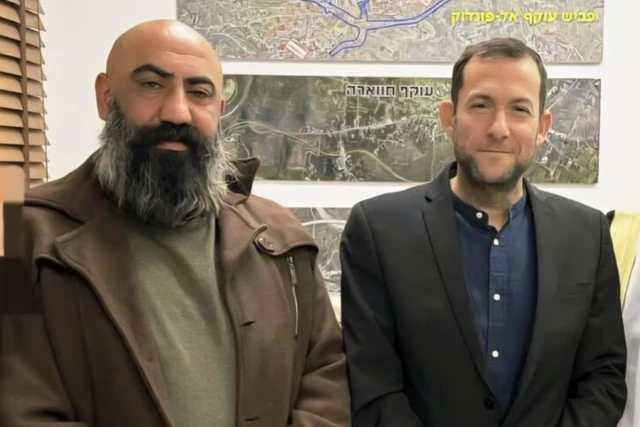Peace without the Palestinian Authority? What Hebron's bold peace pitch really means for Israel

New peace proposals rarely make headlines these days – let alone spark optimism. But a recently floated idea to create a series of self-governing Palestinian emirates in Judea and Samaria under Israeli oversight, while far from viable, offers something increasingly rare: a sliver of hope.
Over the weekend, The Wall Street Journal published an exclusive article featuring a letter and interview with Sheikh Wadee al-Jaabari of Hebron. In it, Jaabari pledges peace and full recognition of Israel as a Jewish state. His plan calls for Hebron to separate from the Palestinian Authority, establish its own emirate, and eventually join the Abraham Accords.
The letter was addressed to Economy Minister Nir Barkat and intended for Prime Minister Benjamin Netanyahu. Jaabari and the other sheikhs backing the plan claim to represent some 700,000 residents in the region.
What makes this development significant is that, for the first time in nearly 30 years, a group of prominent Arab leaders is publicly identifying the Palestinian Authority (PA) – not Israel – as the main obstacle to peace.
"These sheikhs are saying that the Palestinian Authority has not given us anything of value for our lives," Yishai Fleisher, international spokesperson for the Jewish Community of Hebron, told ALL ISRAEL NEWS. "They're saying our kids are being trained in jihadism, and we don't want that. We don't want our money being siphoned to these corrupt folks. We have no freedom. We want our lives back."
In other words, these leaders are stating clearly and without hesitation that the PA is the problem, and Israel may be part of the solution. While the proposed plan is likely unworkable for political and logistical reasons, its narrative impact should not be dismissed. It signals a deep yearning for change and highlights the desperate need for a new generation of Palestinian leadership – one that seeks peace and state-building over state-destroying.
For nearly 90 years, Palestinian leaders have rejected every opportunity to establish a state, from the 1937 British Peel Commission proposal to former Prime Minister Ehud Olmert's secret offer to Mahmoud Abbas in 2008. And each time the peace process collapses, it's the ordinary Palestinians who suffer most.
Moreover, since the horrors of Oct. 7, 2023, few Israelis, if any, still believe a Palestinian state is even remotely viable.
According to Fleisher, the sheikhs pushing this plan are acting out of self-interest and concern for their people. They want a better future for their communities. Despite the enormous personal risk, their willingness to back this idea publicly says a lot about how desperate the situation has become.
The PA is deeply corrupt. Abbas has clung to power for nearly two decades without holding elections. The PA rewards terrorists through its "Pay for Slay" policy and siphons off funds meant to help the public. Since the Oct. 7 massacre, most Palestinians have been barred from working in Israel, and the economic opportunities the PA should have developed simply don't exist.
In their letter, the sheikhs propose starting small: allowing 1,000 Hebron residents to work in Israel as a test case, followed by 5,000 more. According to the Wall Street Journal, Sheikh Jaabari says that Barkat has told them this number could grow to 50,000 or more.
From Israel's perspective, the plan sounds almost too good to be true. It would essentially shelve the issue of Palestinian statehood for the foreseeable future while formalizing Israeli control over Judea and Samaria. It skirts the thorniest issues – Jerusalem, and the right of return.
For some, it may look like a shortcut to stability. But not everyone sees it that way.
"It is an escape hatch from genuinely addressing a century-old and globally resonant conflict that is not about municipal governance," said veteran journalist Dan Perry. He warned that the plan "risks leading not to peace but to more war."
The plan bears a striking resemblance to Israel's Village Leagues initiative of the late 1970s and early 1980s – which also started in Hebron and aimed to sideline the Palestine Liberation Organization, the forerunner of today's PA. But the leagues never gained real traction among the Palestinian public and eventually collapsed, paving the way for the First Intifada in 1987.
Middle East analyst Dan Feferman told ALL ISRAEL NEWS he doesn't expect this new proposal to turn out any differently.
"The idea of Palestinian' emirates' is one that has been pushed around for many years. It does not seem practical to me simply because I don't think there are enough Palestinians who get behind such an idea," Feferman said. "Any idea that is implemented within the Palestinian territories has to take into account the majority of the Palestinians themselves. From what I understand, there are simply not many who back such an idea and therefore it won't hold."
Put differently, even if the idea looks good on paper, it's unlikely to survive without broad support from the Palestinian public and buy-in from key factions.
Perry also warned that the Palestinian street is deeply fractured and plagued by internal strife. Speaking to ALL ISRAEL NEWS, he said that a move like this could ignite a civil war among Palestinians – one that would inevitably spill into the surrounding Jewish communities scattered across the territories.
He also raised serious demographic concerns. If Palestinians were to gain some version of Israeli citizenship under this model, Jews could soon find themselves a minority in their own country, Perry said.
"A future in which Palestinians live in isolated tribal enclaves under Israeli control – in noncontiguous sheikhdoms … would formalize a reality in which a Jewish minority rules millions of Palestinians without political rights," Perry wrote in a related opinion piece.
Security officials reportedly agree. Both the IDF and the Shin Bet have dismissed the plan, saying ongoing coordination with the Palestinian Authority is essential for preventing terror.
Feferman added that comparisons to the United Arab Emirates are misplaced.
"The Emirates are seven states in a federal system, each aligned with a tribal ruler and all united under a central authority loyal to the Nahyan tribe in Abu Dhabi," he told AIN. "If such a reality of different clans in different major Palestinian cities existed, then it would be practical. But I am not aware that this is the reality on the ground."
The Hebron plan may not be feasible or practical – at least not today. But it's easy to see why pro-Israel Jews and Christians abroad, and Israelis and Palestinians searching for a path to resolution, find it appealing.
After Hamas brutally murdered more than 1,200 Israelis on Oct. 7 many lost hope.
Even before that massacre, support for a two-state solution had been steadily eroding. Disillusionment runs deep on both sides. This new proposal, flawed as it may be, offers an alternative – and, more importantly, a reminder that new ideas can still be explored even after 21 months of war.
Whether or not this plan moves forward is less important than what it represents: the re-emergence of hope and the willingness to imagine a different future.
.jpg)
Maayan Hoffman is a veteran American-Israeli journalist. She is the Executive Editor of ILTV News and formerly served as News Editor and Deputy CEO of The Jerusalem Post, where she launched the paper’s Christian World portal. She is also a correspondent for The Media Line and host of the Hadassah on Call podcast.
You might also like to read this:









